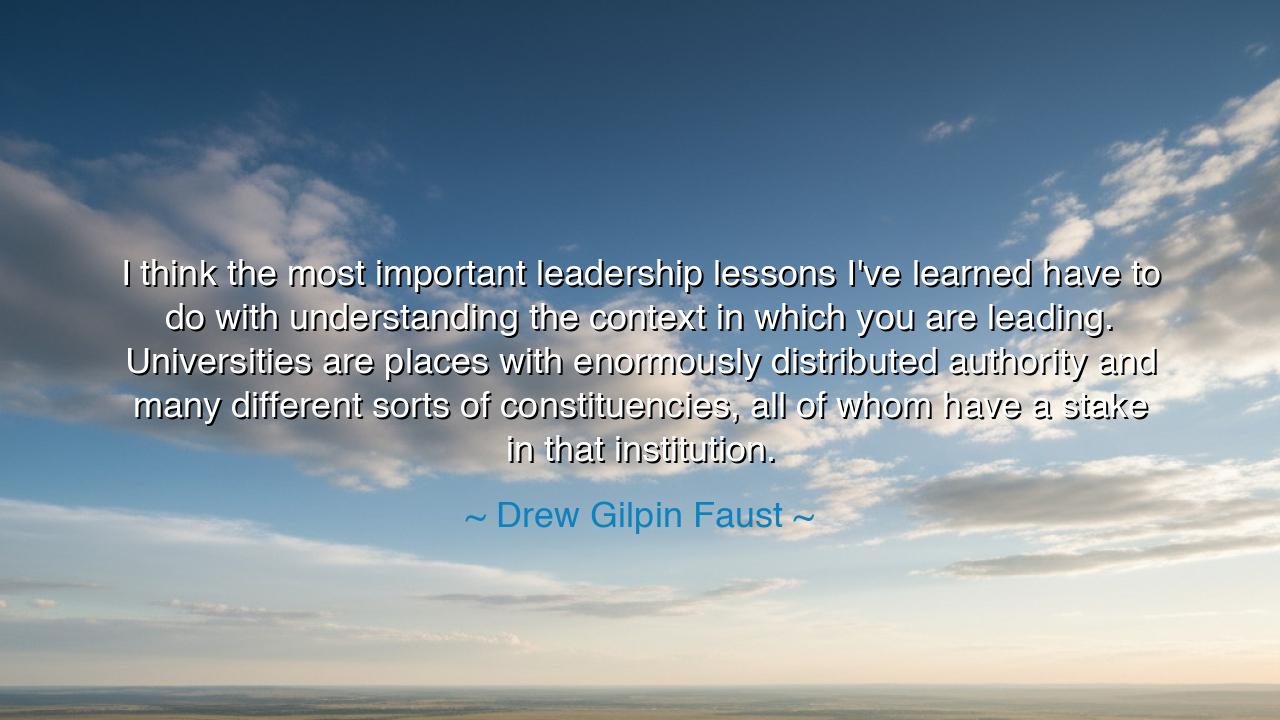
I think the most important leadership lessons I've learned have
I think the most important leadership lessons I've learned have to do with understanding the context in which you are leading. Universities are places with enormously distributed authority and many different sorts of constituencies, all of whom have a stake in that institution.






Hear now the wisdom of Drew Gilpin Faust, who spoke these words of guidance: “I think the most important leadership lessons I’ve learned have to do with understanding the context in which you are leading. Universities are places with enormously distributed authority and many different sorts of constituencies, all of whom have a stake in that institution.” In this reflection, spoken by one who bore the mantle of president at Harvard, lies an eternal truth: that leadership is not merely the exertion of will, but the art of reading the landscape in which one stands, of perceiving the forces, voices, and hearts that shape an institution or a people.
The meaning of these words is not small. Many imagine leadership as a solitary act of command, a lone figure issuing decrees from on high. Yet Faust reminds us that in great institutions, as in nations, authority is not held in one hand but is scattered across many—trustees, teachers, students, alumni, and the public at large. To lead in such a place requires not only vision, but sensitivity to context: to the traditions, to the distributed sources of power, and to the many who believe the institution belongs partly to them.
Consider the example of Pericles in ancient Athens. He was not a tyrant ruling by force, but a statesman in a democracy, where authority was widely distributed among citizens, councils, and assemblies. His greatness lay in his ability to understand this context, to harmonize the voices of the people, to balance the desires of the many while guiding them toward a vision of Athens as the shining school of Greece. Pericles thrived because he understood that leadership in such a setting was not about domination, but about weaving together the diverse strands of authority into a common fabric.
So too in modern times, Faust herself faced the complexities of a university, a place where faculty guard their independence, students press for change, and traditions weigh heavily upon innovation. To lead such a place was not to command like a general, but to listen, to negotiate, and to honor the diverse constituencies who each carried their own stake in the institution. Her lesson is that true leadership is situational—it cannot be divorced from the living environment in which it is exercised.
The origin of this truth lies in the very nature of institutions built upon shared governance. Universities, unlike corporations or armies, are bound together by debate, by traditions of inquiry, by the independence of many voices. To ignore this reality, to try to impose authority without regard for it, is to invite resistance, division, and failure. Faust, as a scholar of history, understood that context shapes outcome, and that only by respecting the many voices of the academy could she guide it into the future.
The wisdom here is powerful: a leader must be both visionary and interpreter. One cannot transplant the same methods into every field, for the soil differs. To lead soldiers is not the same as leading scholars; to govern a company is not the same as governing a democracy. Context is the unseen ground upon which all leadership stands, and without respect for it, even the strongest plans collapse.
The lesson, O listener, is this: if you would lead, first learn where you are. Do not rush to command before you have listened, observed, and understood the voices around you. Know the traditions, the distribution of power, the hopes and fears of those you serve. Then, when you speak, your words will carry weight, for they will be rooted in the soil of understanding.
Practical action lies before you: in your family, your work, your community, ask first—what is the context here? Who are the stakeholders, the unseen forces, the currents of tradition? Do not impose your will as though in a vacuum, but let your leadership adapt, grow, and harmonize with the reality around you. For as Faust declares, the greatest leadership lessons are not abstract—they are born of living within the world as it truly is, and guiding it with wisdom rather than with arrogance.
Thus remember her words: “The most important leadership lessons… have to do with understanding the context.” For the wise leader is not blind to the ground upon which they walk, but sees it clearly, and because they see, they guide others with steadiness and strength.






AAdministratorAdministrator
Welcome, honored guests. Please leave a comment, we will respond soon